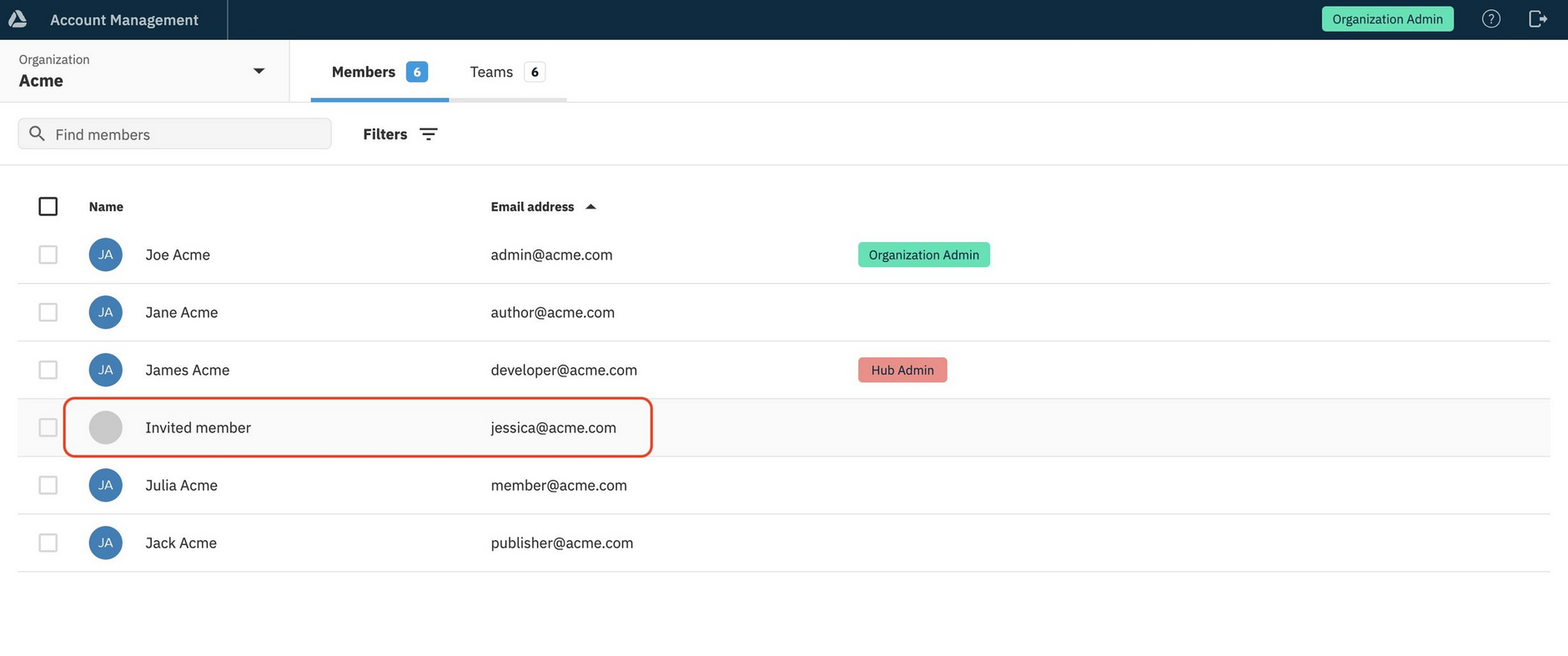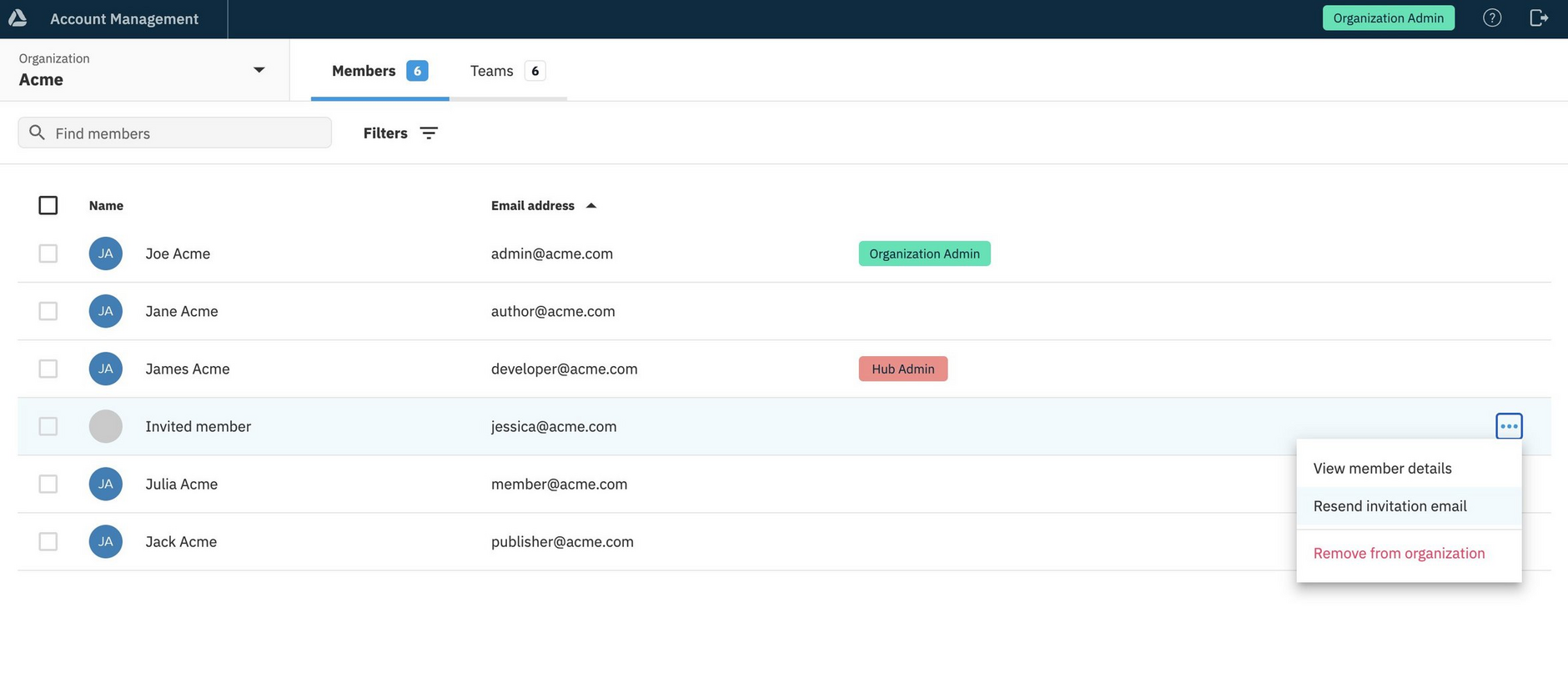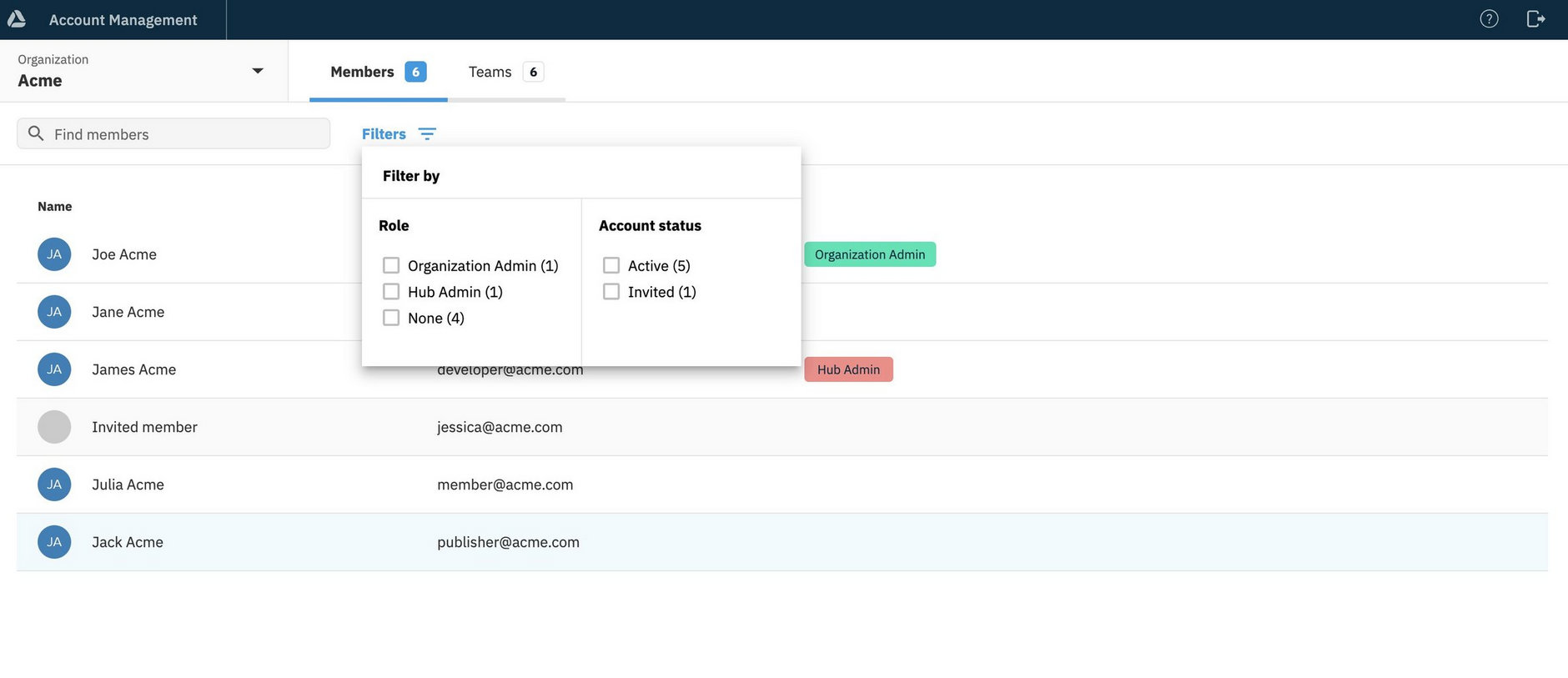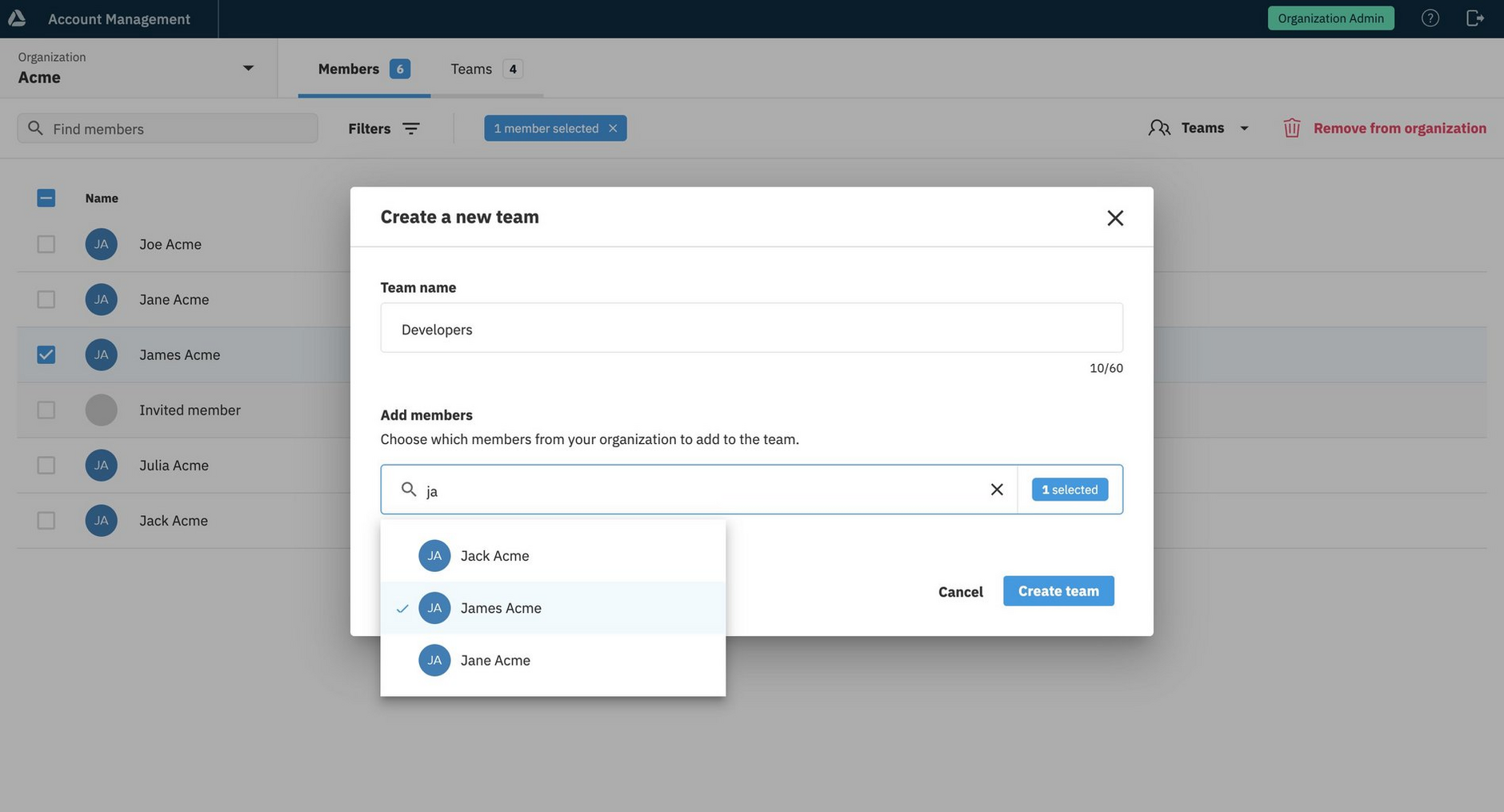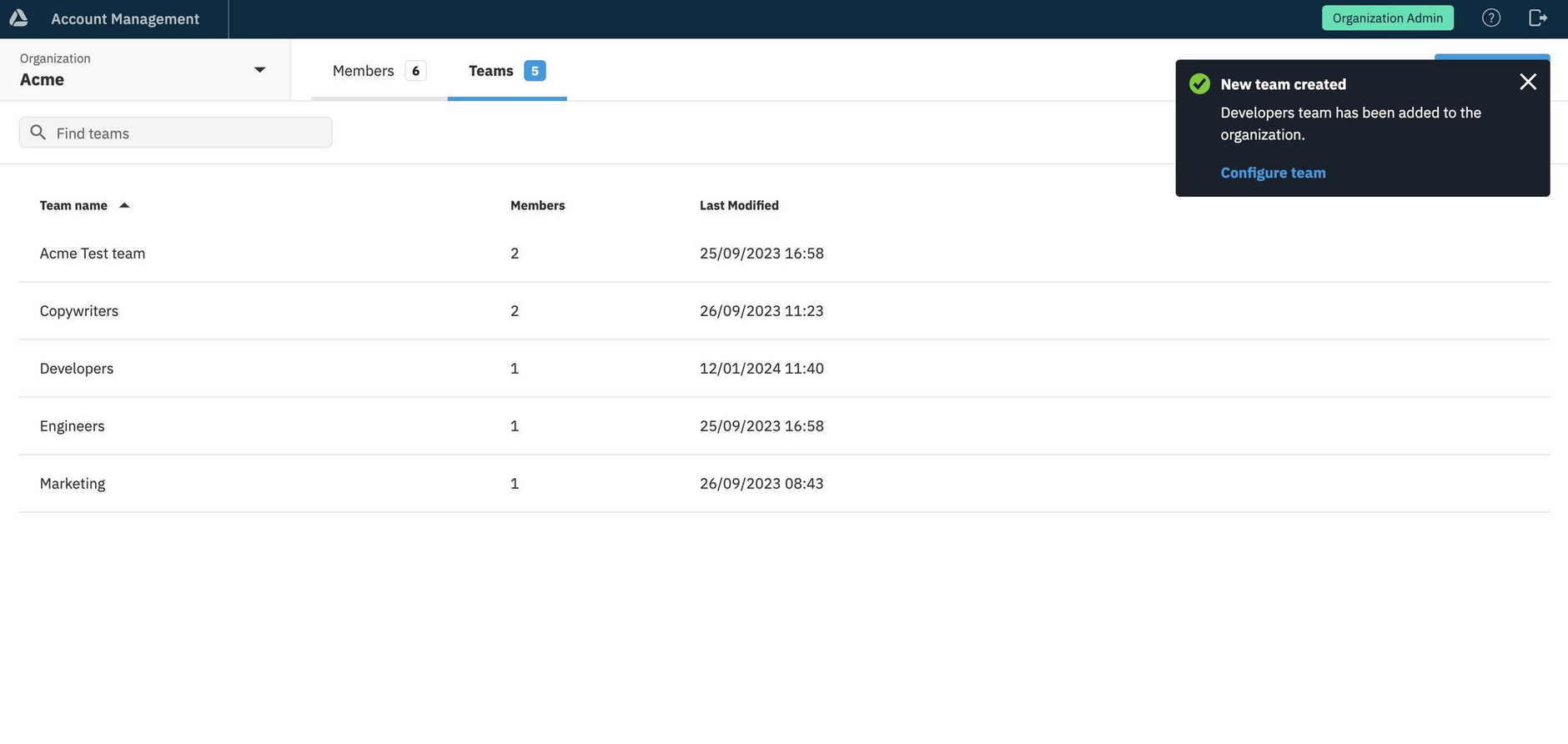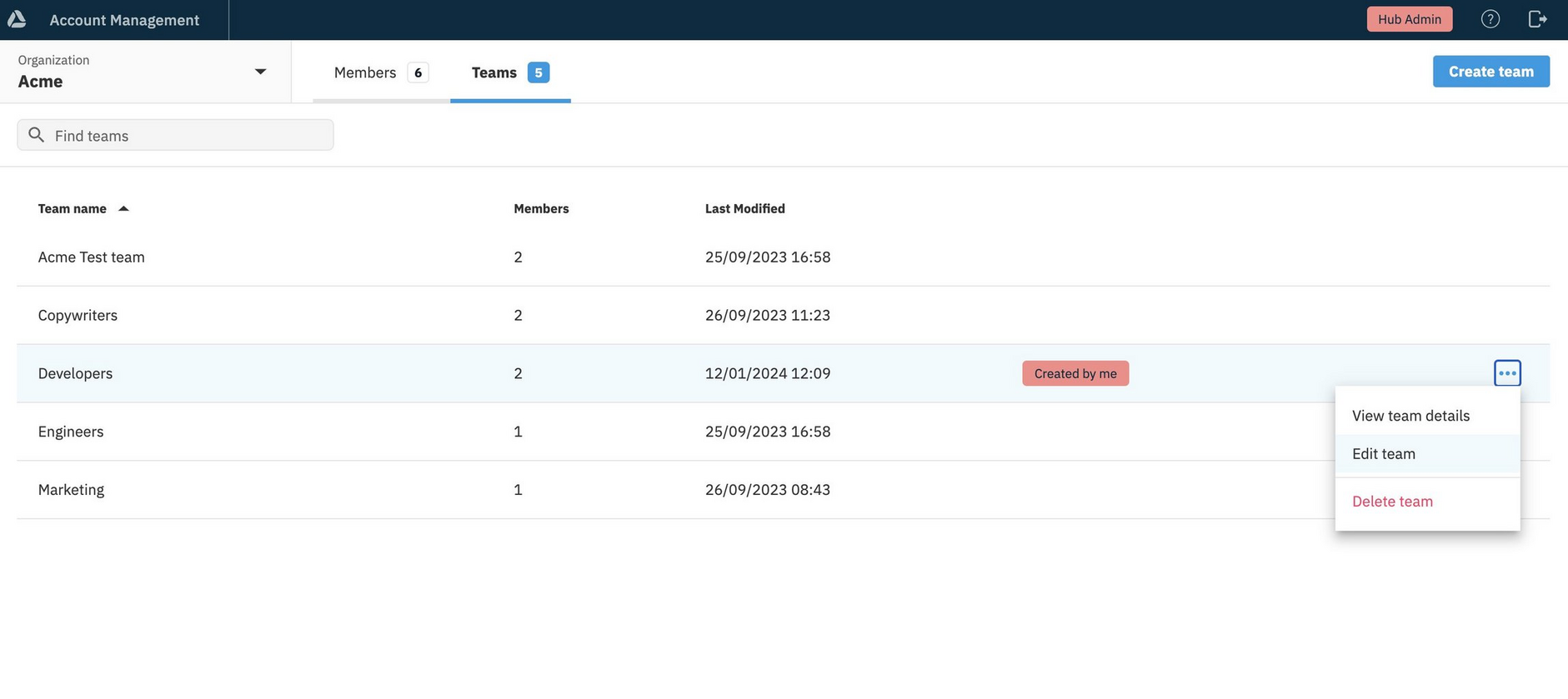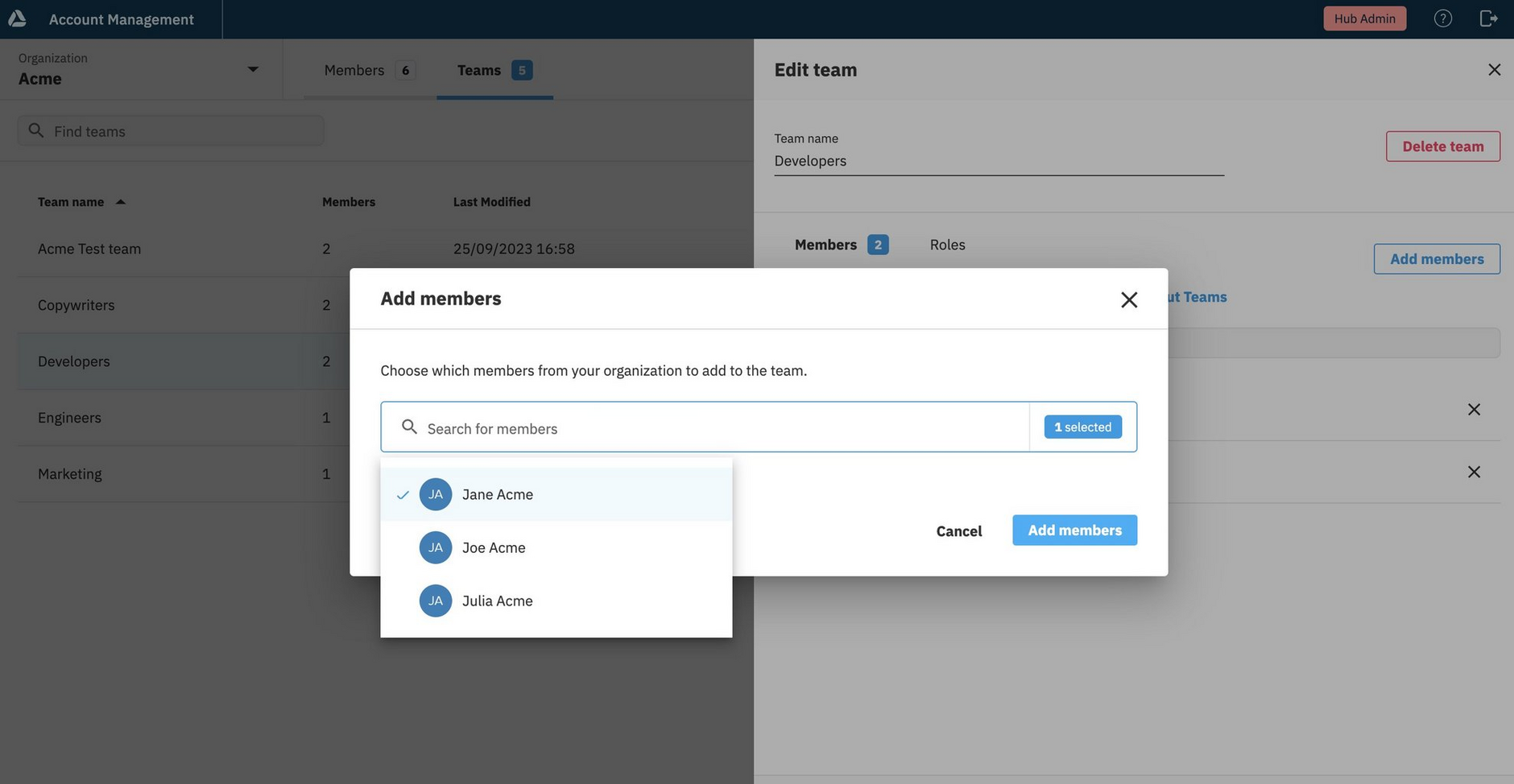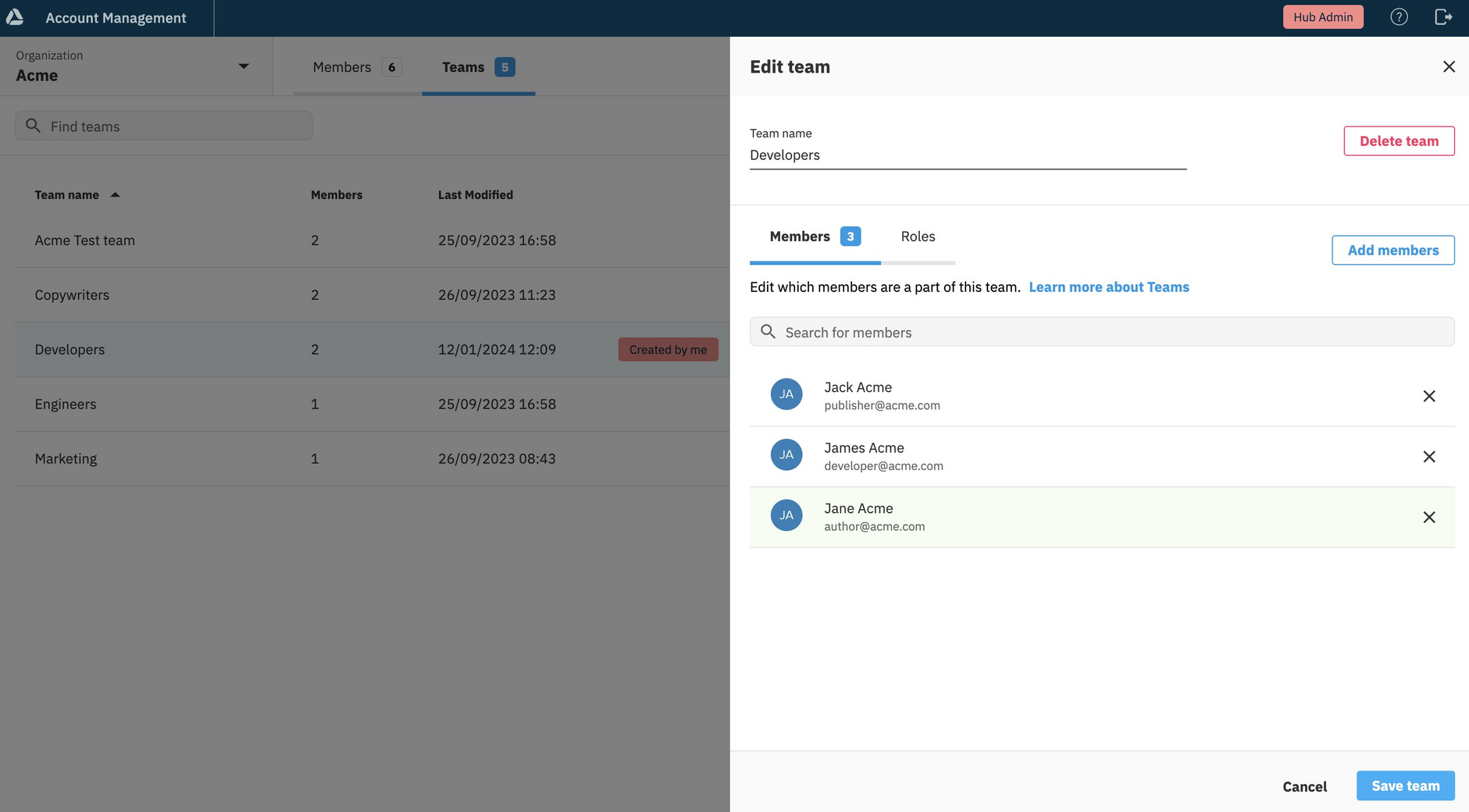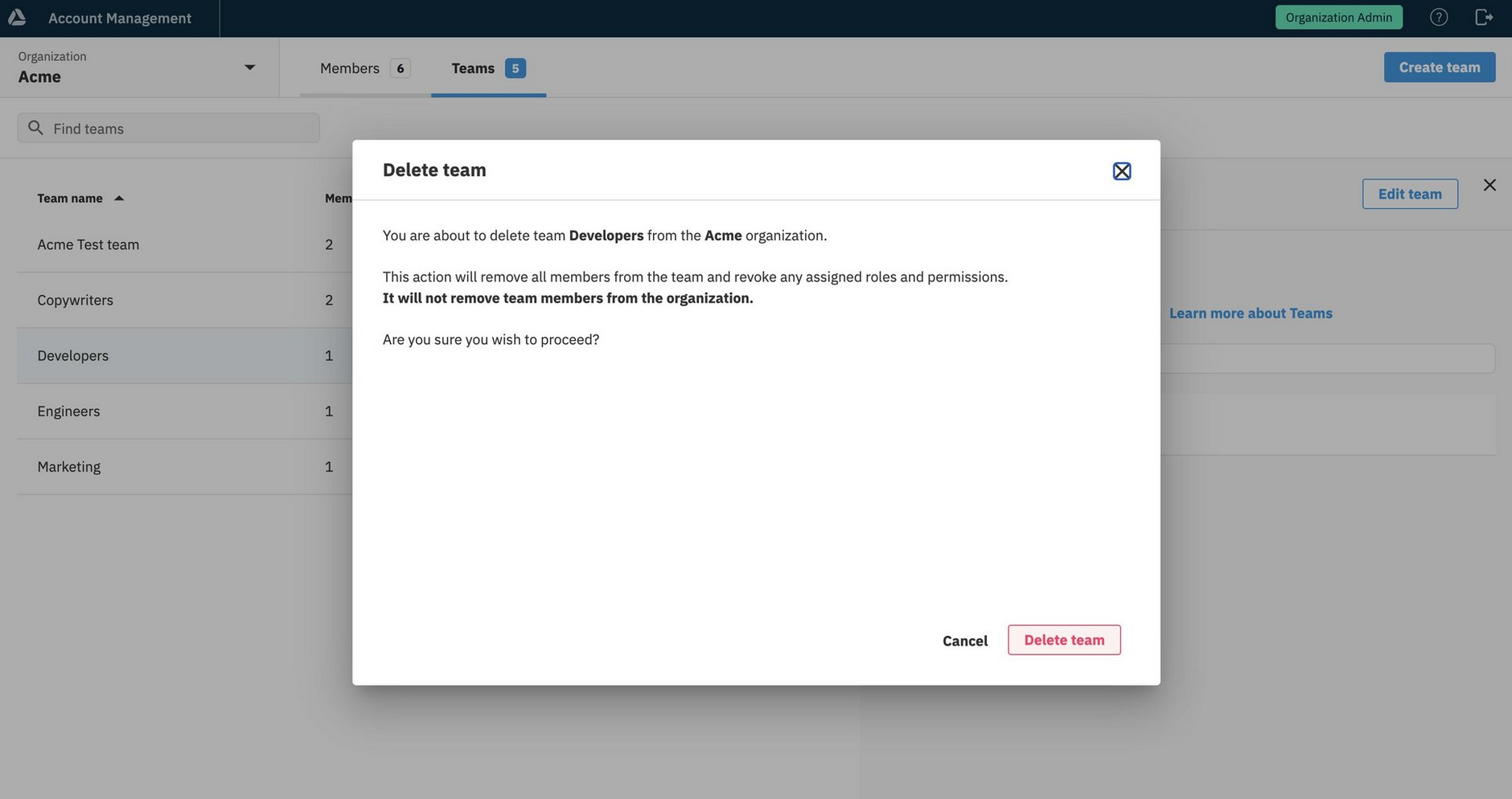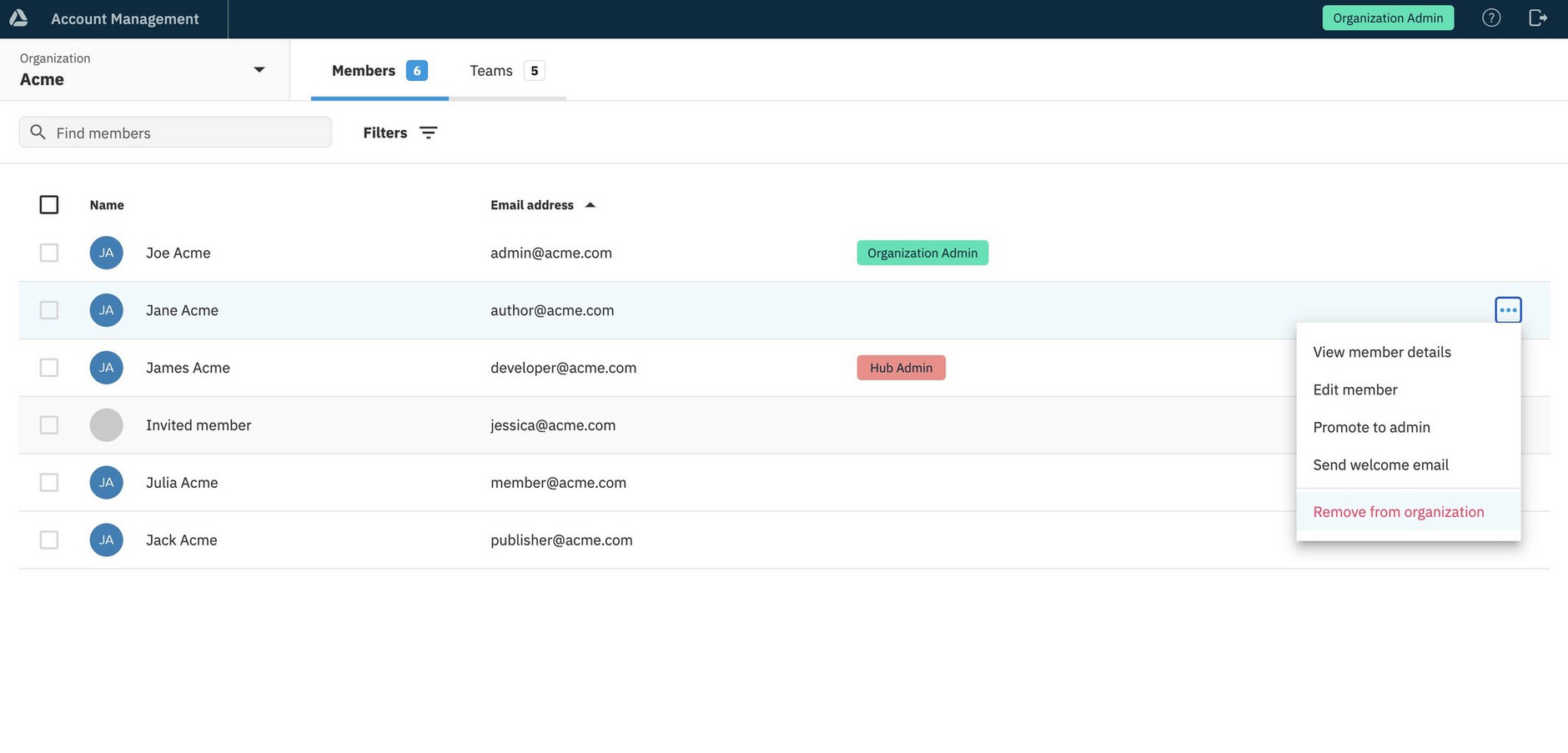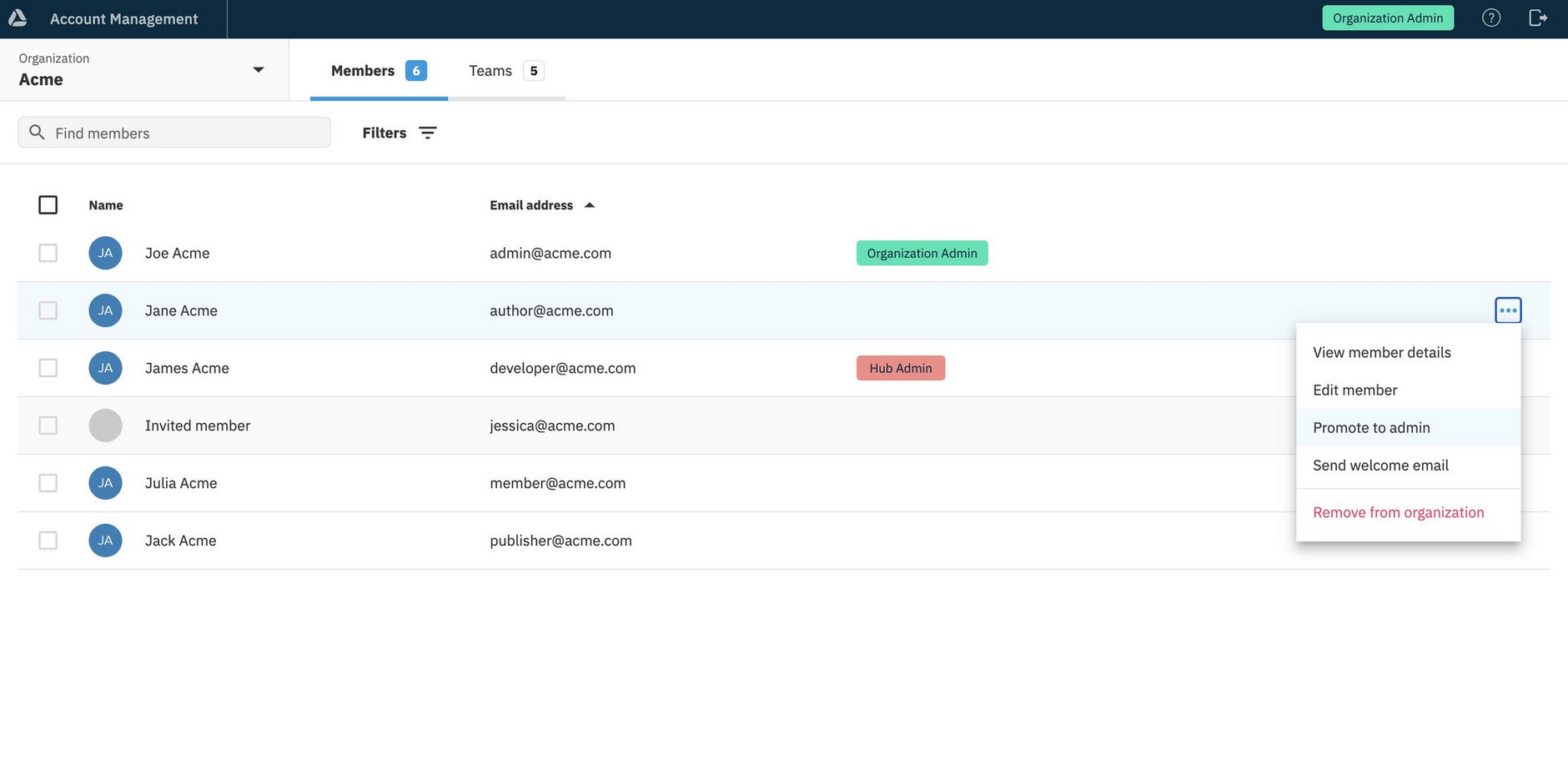Managing members and teams
Account management enables users with the necessary admin permissions to control user access to Dynamic Content hubs and repositories using:
Organizations - A user must be an 'active member' of an organization to access its hubs and repositories
Members - Member is the term used in account management to refer to users in an organization
Teams - Members can be grouped into teams
Organization administrators can perform all account management actions. Users with the hub admin role can perform a subset of the organization admin actions. See hub admin role.
Account Management shows members and teams for your selected organization. If you have more than one organization, you can switch to a different one. If you log in as an organization or hub admin user, your permission level is displayed at the top of the window. In the example below, an organization admin user is logged in.
The "Members" tab lists all users who are members of the organization, along with their names. Users who haven't yet accepted their invitation are also listed, but have Invited member displayed instead of their user name. See Inviting members.
All members in an organization can see all other organization members, teams and permissions.
Creating user accountsLink copied!
You can give users access to Dynamic Content by creating user accounts with Account Management.
Dynamic Content user accounts also provide access for Amplience Studios, provided studios are enabled for your account.
If your account is set up to use SSO, Dynamic Content user accounts will be automatically created when users log in, so you don't need to manually create accounts for them. See Using single sign-on.
The steps to create user accounts are:
- The organization administrator invites users to join an organization.
- Users must confirm their invites to complete account creation.
Once new user accounts are created, an admin user must set permissions for those users before they can start using Dynamic Content.
To create Content Hub user accounts, please raise a service ticket through the Amplience Support portal.
Inviting membersLink copied!
Only organization administrators can invite users to join an organization.
To send invites, from the Account Management "Members" tab choose "Invite members", and then enter user email addresses.
You don't need to invite users who use Single sign-on, their accounts will be automatically created when they log in. See Using single sign-on.
The email addresses are checked to ensure they're unique within an organization, correctly formatted and don't exceed the number of allowed users for the organization.
Email invites are sent to users when you click "Send Invitations".
Each invite you send reduces the number of user accounts remaining in your balance.
To remove a user invite you need to remove the user from the organization.
Once users have been invited, they are listed on the "Members" tab with gray highlighting until they confirm their invites.
Invitation confirmationLink copied!
Users complete the account creation process by doing the following:
- Accept their email invitation and set a password for their Dynamic Content account. This prompts a final verification email to be sent to the user.
- Open the final verification email and confirm their new account. This creates the new user account.
Before users with newly created accounts can start using Dynamic Content, an admin user must set permissions for those users.
Invites expire after 7 days if not accepted, and will need to be sent again by the organization admin.
Using Single sign-on (SSO)Link copied!
If your account is set up for SSO, Dynamic Content user accounts will be automatically created when users log in. All you need to do is give users their permissions for accessing Dynamic Content.
To avoid duplicate Dynamic Content user accounts, only send email invites to users who will not log in using SSO.
Duplicate Dynamic Content user accountsLink copied!
If users log in to Dynamic Content using their email invite and then log in through their SSO account, they will appear in account management twice. Any permissions set for one account are automatically applied to the other account.
For improved account security, we recommend that organization admins delete non-SSO users and don't re-invite them.
Resending invitationsLink copied!
To remind an invited user to accept their invitation, hover over the user and choose "Resend invitation email" from the contextual menu.
Filter the list to show only 'Invited users'.
Searching and filtering membersLink copied!
All members of an organization can refine the list of members shown in Account Management, using the search and filters.
The search looks for your search text in member names and email addresses.
The members list shows all members in an organization, by default. To filter the list use:
Filter by Role - To show members with the organization admin role, hub admin role or members with no admin roles
Filter by Account status - To show members who are active or invited
Creating teamsLink copied!
Users who have the necessary permissions can create teams in the following ways:
- From the Teams tab, click "Create team"
- From the Members tab, select the members, then choose "Create new team" from the Teams menu
You must be either:
- An organization admin
- A user with the admin role on a hub. Users with the hub admin role can use teams to set permissions on the relevant hubs
The Create team dialog is displayed. Enter a team name that is unique within the organization. If you chose to create the team based on selected members, those members are already selected.
Click "Create team" to save the team. A notification confirms the team is created and gives the option to "configure" the team, by adding more members and setting permissions.
Adding members to existing teamsLink copied!
You can add members to teams in the following ways:
You must be either:
- An organization admin
- A user with the hub admin role, who has created the team
Adding members to a single teamLink copied!
To add members to a single team, from the Teams tab select "Edit team" from the contextual menu. Notice in the example below, the logged in user has hub admin permissions (identified at the top of the window) and is therefore allowed to edit teams that they have created. The "Created by me" tag highlights which teams a hub admin user has created.
From the Edit team pane, use "Add members" to add the members you want. Members who are already in the team are not shown in the list.
Clicking "Add members" updates the Edit team pane, to show the proposed new members. To confirm the new team members, click "Save team". Any other changes you have made to the team will also be saved.
Adding members to multiple teamsLink copied!
You can quickly add a group of members to multiple teams as a bulk action.
To add members to multiple teams, select the members on the Members tab, then choose "Add to teams" from the Teams menu.
The Teams menu is shown on the Members tab, when one or more members are selected.
The "Add to teams" dialog is displayed for you to choose the teams to which you want to add the selected members.
Deleting teamsLink copied!
To delete a team, from the Teams tab, choose "Delete" from the team's contextual menu. You must be an organization admin or a user with the hub admin role who created the team.
You must be either:
- An organization admin
- A user with the hub admin role, who has created the team
When you delete a team, only the team is deleted. All members of the team remain in the organization and in any other teams in which they are included.
Removing members from teamsLink copied!
You can remove members from a single team and from multiple teams.
You must be either:
- An organization admin
- A user with the hub admin role, who has created the team
Removing members from a single teamLink copied!
From the Teams tab, select "Edit team" from the team's contextual menu. Then select the members to remove from the team, by clicking X.
Click "Save team" to remove the members. Any other changes you have made to the team will also be saved.
Removing members from multiple teamsLink copied!
You can quickly remove a selection of members from multiple teams, as a bulk action.
To remove members from multiple teams, select the members on the Members tab, then choose "Remove from teams" from the Teams menu.
The Teams menu is shown on the Members tab, when one or more members are selected.
The Remove from teams dialog is displayed, with members already selected. Choose the teams from which you want to remove the selected members.
Removing members from an organizationLink copied!
Organization administrators can remove member access to all Dynamic Content hubs and repositories in an organization, by removing those members from an organization. Removing a member from an organization automatically removes them from any teams they are in.
Invited users do not yet have a user account, so removing them from an organization completely removes them.
When you remove a user from an organization you are simply canceling them from being a member of an organization, but not removing their user account. If a user is in other organizations, they remain in those organizations, and if a user has access to Content Hub, that access still remains.
This action does not remove user accounts for active members. If the members you remove from an organization no longer require access to Dynamic Content or Content Hub, a support ticket must be raised to completely remove the users.
To remove an individual member from an organization: - From the Members tab, open the member's contextual menu and choose "Remove from organization".
To remove multiple members from an organization: - From the Members tab, select members and then choose "Remove from organization" from the toolbar.
The Remove from organization dialog is displayed, from which you can confirm or cancel.
If a member is removed from an organization by mistake, an invitation must be sent to the user and accepted by them to access the organization again. See Inviting members.
If the removed member was in any teams, they will need to be added to those teams again. See Adding members to teams.


